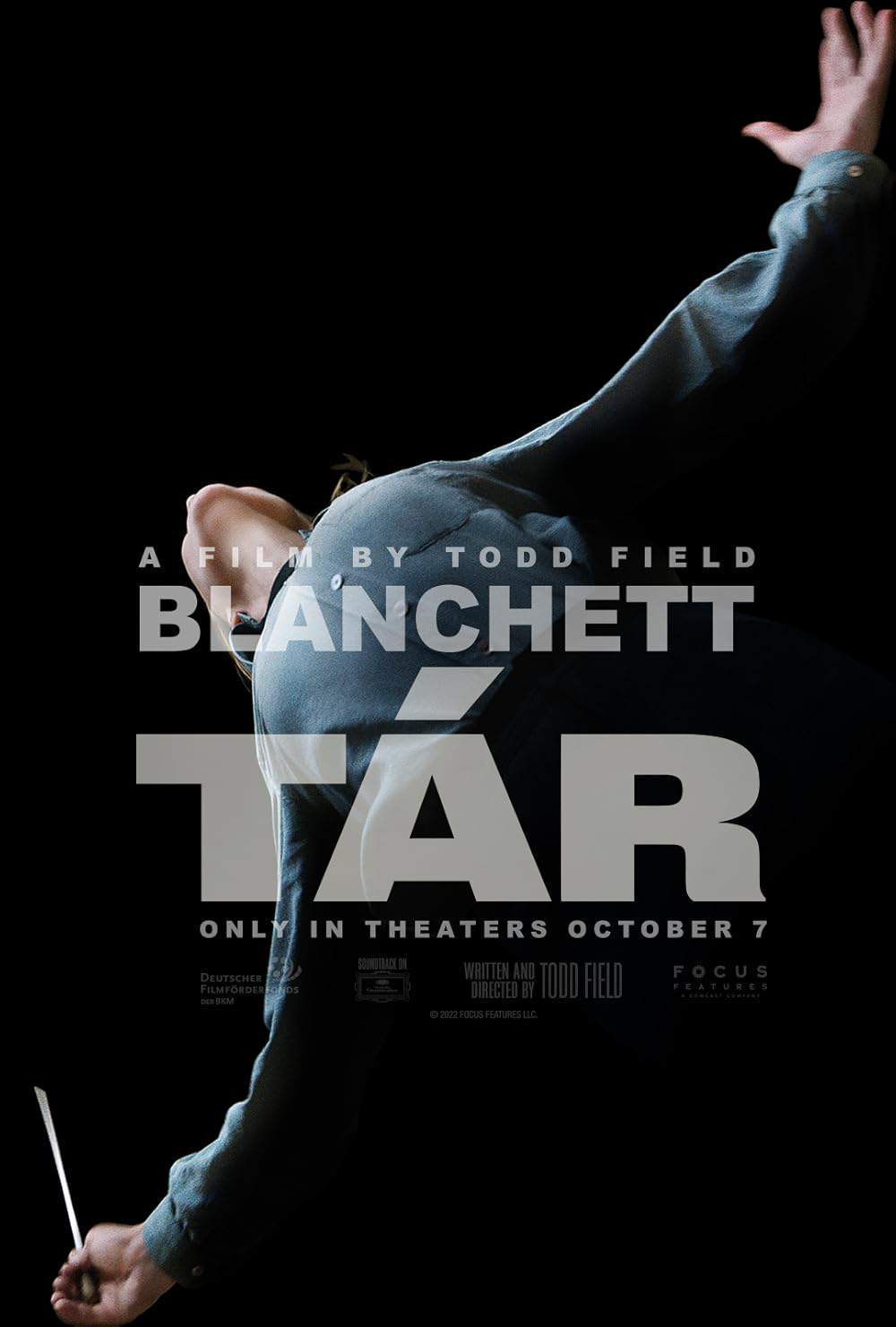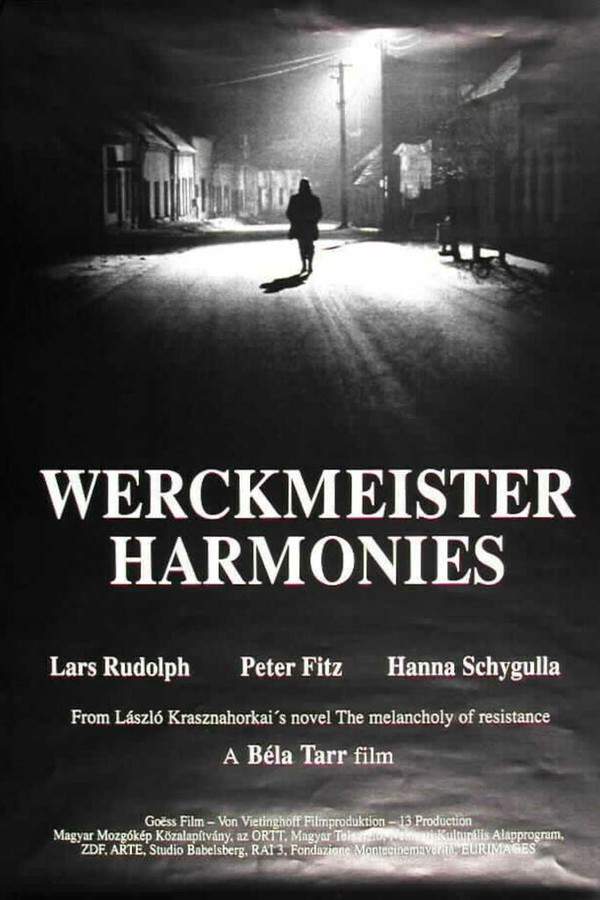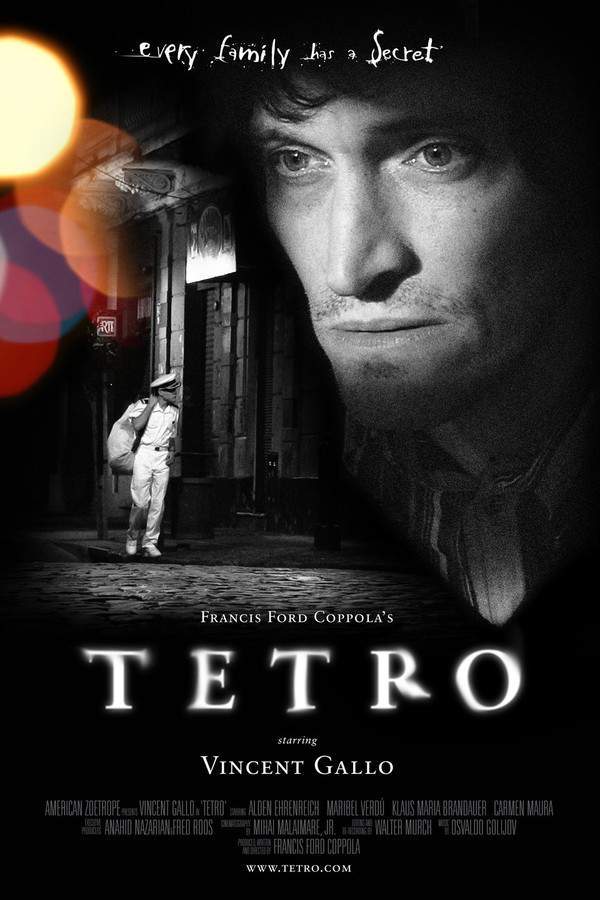
Test your knowledge of TÁR with our quiz!
TÁR Plot Summary
Read the complete plot summary and ending explained for TÁR (2022). From turning points to emotional moments, uncover what really happened and why it matters.
Lydia Tár, portrayed by Cate Blanchett, is celebrated as one of the greatest living composer-conductors and has made history as the first openly gay female chief conductor of the Berlin Philharmonic Orchestra. During a captivating interview at the New Yorker Festival with Adam Gopnik, she discusses her latest projects, notably the live recording of Mahler’s 5th Symphony. From the sidelines, she is supported by her dedicated personal assistant, Francesca Lentini, and her ailing spouse, Sharon Goodnow, who also serves as the concertmaster.
In a dramatic lunch meeting with Eliot Kaplan, a fellow conductor and manager of a fellowship program she initiated for aspiring women conductors, Lydia deliberates on the future of her orchestra. Conversations reveal her intentions to change the assistant conductor position currently held by Sebastian Brix, with an eye toward promoting Francesca, while also addressing a cello vacancy in the orchestra.
As she takes on the role of guest instructor at Juilliard, Lydia’s teaching methods are called into question when she harshly critiques a student named Max (Zethphan Smith-Gneist) for his disinterest in the classical masters shaped by identity politics. Her firm stance leads Max to leave the class in frustration. Meanwhile, the complexities of Lydia’s past surface when she receives a novel, “Challenge,” from Krista Taylor (Sylvia Flote), a former fellow who hints at a troubled, transactional relationship that Lydia had fostered, only to later blacklist Krista, jeopardizing her prospects in conducting.
The stakes rise as Lydia prepares for a blind audition for a new cello position, where she crosses paths with the alluring Olga Metkina (Sophia Kauer) in a private restroom. Lydia’s attraction to Olga leads her to manipulate the audition’s outcome, ensuring Olga a spot in the orchestra and a solo performance paired with Mahler’s 5th. However, as Lydia becomes engrossed in preparing for the recording, tensions grow with both Francesca and Sharon as they become increasingly aware of her infatuation.
After informing Sebastian of his upcoming replacement, Lydia faces accusations of favoritism that hint at potential abuse of power. As the drama unfolds, Krista tragically takes her own life, leaving behind chilling accusations against Lydia that threaten to unravel her career. In a desperate attempt to shield herself, Lydia directs Francesca to erase incriminating emails and enlists legal counsel as Krista’s family plans to pursue a lawsuit against her.
Despite the unraveling of her personal and professional life, Lydia is haunted by her past choices, experiencing terrifying visions and chronic pain, with cherished moments shared with Olga and her adopted daughter Petra offering few escapes. In her turmoil, she becomes increasingly antagonistic towards her worker-class neighbors, leading to a fateful encounter that culminates in injury.
When an edited video of her lecture surfaces online, her life spirals further into chaos. Amid public outrage and protests upon her return to New York for a book promotion and deposition, whispers of Francesca’s betrayal add to her turmoil. Ultimately, estranged from Sharon and Petra, Lydia loses her position as conductor and, in an impulsive act during a live performance, confronts Eliot onstage.
Fleeing from the fallout, she retreats to her childhood home on Staten Island, where she confronts the reality of her identity, learning that her real name is Linda Tarr. Reflecting on her past through old footage of her mentor Leonard Bernstein, she faces family tensions when her brother confronts her.
Months later, Lydia finds herself conducting an orchestra in the Philippines, where her reality blurs further as she encounters familiar yet unsettling scenarios. Selecting a masseuse from a bowl in what appears to be a brothel mirrors the orchestral experiences she once cherished. Overcome with emotion by a girl’s gaze akin to those in her life, Lydia’s discontent culminates in a dramatic rush outside. The film concludes with Lydia conducting a new orchestra, yet the echoes of her complex journey resonate as she finds herself directing a score for a film adaptation of the “Monster Hunter” video game, surrounded by an audience of devoted cos-players.
TÁR Timeline
Follow the complete movie timeline of TÁR (2022) with every major event in chronological order. Great for understanding complex plots and story progression.
Lydia Tár's Acclaimed Career
Lydia Tár is introduced as a revered composer-conductor, making history as the first openly gay female chief conductor of the Berlin Philharmonic Orchestra. Her groundbreaking achievements have solidified her reputation in the classical music world, making her an influential figure in an otherwise male-dominated field.
Interview at the New Yorker Festival
During an engaging interview with Adam Gopnik at the New Yorker Festival, Lydia discusses her recent projects, including a live recording of Mahler's 5th Symphony. This moment captures her passion for music and her ambitious plans for the future.
Lunch Meeting with Eliot Kaplan
In a pivotal lunch meeting with fellow conductor Eliot Kaplan, Lydia considers the future direction of her orchestra. This conversation sheds light on her desire to replace the current assistant conductor, Sebastian, with her assistant Francesca, highlighting Lydia's strategic approach to management.
Controversial Teaching at Juilliard
While serving as a guest instructor at Juilliard, Lydia's unyielding criticism of student Max provokes controversy. Her insistence on a return to classical ideals amid discussions of identity politics leads to Max feeling frustrated enough to leave her class.
The Arrival of the Novel 'Challenge'
Lydia receives a novel titled 'Challenge' from Krista Taylor, a former associate. This book rekindles painful memories of their troubled, transactional relationship, revealing Lydia's past mistakes and the consequences of her actions.
The Blind Audition and Olga
At a blind audition for a cello position, Lydia encounters the captivating Olga Metkina. Her attraction leads her to manipulate the audition's results, paving the way for Olga's inclusion in the orchestra, which sets off a series of personal and professional conflicts.
Conflict with Francesca and Sharon
As Lydia becomes consumed with the preparation for the recording of Mahler's 5th, tensions rise with her assistant Francesca and her spouse Sharon. Their growing concern over Lydia's infatuation with Olga strains their relationships and adds pressure to Lydia's already chaotic life.
Sebastian's Replacement and Accusations
After informing Sebastian of his impending replacement, Lydia faces backlash and accusations of favoritism. This moment underscores the toxic environment within her orchestra and raises questions about her leadership and ethical conduct.
Krista's Tragic Death
The narrative takes a dark turn as Krista tragically takes her own life, leaving behind grave accusations against Lydia. This shocking event not only threatens Lydia's career but also forces her to confront the damaged relationships and mistakes of her past.
Legal Troubles and Erased Evidence
In the aftermath of Krista's death, Lydia orders Francesca to delete incriminating emails while seeking legal guidance. The impending lawsuit from Krista's family creates an oppressive atmosphere that heightens Lydia's anxiety and desperation.
Mental Turmoil and Public Outrage
As her life spirals out of control, Lydia grapples with psychological turmoil, haunted by her past choices. When an edited video of her lecture goes viral, public outrage erupts, culminating in protests during her return to New York for a book promotion.
Confrontation with Eliot onstage
In an impulsive moment during a live performance, Lydia confronts Eliot onstage, revealing the extent of her unraveling. This public outburst is emblematic of her loss of composure in both personal and professional spheres.
Return to Staten Island
Seeking refuge from the chaos, Lydia flees to her childhood home on Staten Island. Here, she confronts her true identity, realizing her real name is Linda Tarr, and grapples with family tensions, leading to a moment of personal reckoning.
Conducting in the Philippines
Months later, Lydia finds herself conducting an orchestra in the Philippines, where her perception of reality begins to blur. The experience evokes both nostalgia and discomfort as she faces familiar yet unsettling scenarios from her past.
Final Performance
The film culminates with Lydia conducting a new orchestra, embodying mixed emotions as she navigates her complex journey. While surrounded by devoted cos-players for a film adaptation score, echoes of her tumultuous past continue to resonate in her present.
TÁR Characters
Explore all characters from TÁR (2022). Get detailed profiles with their roles, arcs, and key relationships explained.
Lydia Tár (Cate Blanchett)
Lydia Tár is depicted as a complex and ambitious conductor whose life spirals out of control due to her choices and the dark aspects of her past. As a celebrated figure in classical music, her brilliance is overshadowed by manipulation, favoritism, and the ensuing fallout from her relationships. Lydia’s struggle with her identity and the consequences of her actions make her a profoundly flawed yet compelling character.
Francesca Lentini (Noémie Merlant)
Francesca is Lydia's devoted personal assistant who finds herself caught in the turmoil of Lydia's professional and personal life. Her aspirations clash with Lydia's domineering presence, particularly when Lydia decides to promote her, putting Francesca in a precarious position. Despite her loyalty, Francesca's own desires and the unfolding drama test her relationship with Lydia.
Sharon Goodnow (Nina Hoss)
Sharon Goodnow serves as Lydia's concertmaster and ailing spouse, embodying the challenges of supporting a powerful partner while facing her struggles. Her presence adds depth to Lydia’s character, showcasing the toll that ambition and obsession can take on intimate relationships. Sharon’s character highlights themes of sacrifice and loyalty amidst personal crises.
TÁR Settings
Learn where and when TÁR (2022) takes place. Explore the film’s settings, era, and how they shape the narrative.
Time period
Contemporary
The film is set in the contemporary period, reflecting modern dynamics of the music industry and personal relationships. This time frame encapsulates ongoing conversations about identity, power dynamics, and the complexities of fame in today's society. It highlights both the achievements and turmoil that can accompany contemporary artistic careers, especially for women.
Location
Berlin, Juilliard, Staten Island, Philippines
The movie primarily takes place in Berlin, the cultural hub known for its rich history in music and the arts, especially as home to the Berlin Philharmonic Orchestra. Juilliard, a prestigious performing arts school in New York, serves as a backdrop for Lydia's controversial teaching. Staten Island, where Lydia returns to confront her identity, offers a glimpse into her past and family ties. The film also ventures to the Philippines, presenting Lydia's ongoing struggles as she seeks to redefine her career amidst familiar discomforts.
TÁR Themes
Discover the main themes in TÁR (2022). Analyze the deeper meanings, emotional layers, and social commentary behind the film.
🎭
Identity
Identity is a central theme, as Lydia Tár grapples with her public persona and personal reality. The exploration of her identity extends to her relationships and societal roles, particularly as a gay woman in a position of power. As her past resurfaces, the film questions the authenticity of her constructed identity against the backdrop of success and notoriety.
⚖️
Power Dynamics
The film delves deeply into themes of power dynamics within the music world and personal relationships. Lydia's interactions reveal the complexities of favoritism, manipulation, and the repercussions of abuse of power. As she navigates her professional ambitions, the consequences of her choices culminate in a broader commentary on accountability in leadership.
💔
Fallen Grace
Lydia's journey reflects the theme of fallen grace as her illustrious career begins to unravel. The film illustrates the fragility of success and how personal actions can swiftly lead to professional demise. Her descent into chaos serves as a poignant reminder of how quickly one can lose everything, highlighting the duality of public admiration and private turmoil.

Coming soon on iOS and Android
The Plot Explained Mobile App
From blockbusters to hidden gems — dive into movie stories anytime, anywhere. Save your favorites, discover plots faster, and never miss a twist again.
Sign up to be the first to know when we launch. Your email stays private — always.
TÁR Ending Explained
Unravel the ending of TÁR (2022) with our detailed explanation. Understand the final scenes, character fates, and unresolved questions.
The ending of “Tár” is layered with ambiguity and open to interpretation. As Lydia Tár’s professional and personal worlds collapse—she loses her prestigious positions, faces protests, and becomes isolated—she seems to spiral into a state of mental disintegration. Some argue that the scenes showing her attacking her replacement conductor and the disturbing images at the brothel might be hallucinations or symbols of her guilt and psychological torment. The film subtly suggests that Lydia is haunted by her past actions, especially regarding her abusive relationships with students and the tragic suicide of Krista, her former protégée. These echoes of her guilt and shame are reinforced by the final scene, where Lydia conducts a performance of the video game Monster Hunter, a strange and almost surreal choice. This scene, with its heightened realism and bizarre context, can be seen as a hallucination or a symbolic reflection of her inner state—highlighting her mental unraveling rather than a literal continuation of her life. Within this interpretation, Lydia’s conduct of Monster Hunter, a game about a hunt or a monster, cleverly symbolizes her own perception as a monster—haunted by her past and constantly in pursuit of some form of redemption or escape. The film’s choice to end with her performing in front of cosplayers, conducting a score from a video game, underscores her downfall from revered artist to a humbling figure who is still driven by her obsession with music, despite everything. Ultimately, “Tár” invites viewers to consider whether Lydia’s final moments are real or a manifestation of her fractured mind—leaving her fate open-ended—while highlighting the film’s themes of guilt, abuse, and the destructive pattern of power and violence. The movie’s ending, complex and unsettling, leaves much to ponder about Lydia’s true state of mind and whether she might still be capable of revival or if she is doomed to remain haunted by her past.
TÁR Spoiler-Free Summary
Discover the spoiler-free summary of TÁR (2022). Get a concise overview without any spoilers.
In the rarefied world of classical music, Lydia Tár stands at the apex of a career few can imagine—an acclaimed composer‑conductor who has broken barriers as the first openly gay female chief of the Berlin Philharmonic. The film opens as she prepares for a major book launch and a live recording of Mahler’s Fifth Symphony, a project that promises to cement her legacy. Surrounded by the glittering veneer of concert halls, festivals, and the high‑stakes world of elite orchestras, Lydia’s life is a study in precision, power, and the relentless demand for artistic perfection.
Yet the very environment that celebrates her genius also magnifies every vulnerability. Her inner circle includes Francesca, a fiercely loyal personal assistant whose devotion is both a support and a subtle mirror to Lydia’s own ambitions, and Sharon, her spouse and concertmaster, whose partnership blends professional collaboration with intimate companionship. Together they navigate the politics of appointments, the delicate balance of mentorship, and the ever‑present scrutiny of a public that both adores and judges artistic icons.
The tone of the film is a hushed, almost reverent suspense, where the grandeur of symphonic performance contrasts with the quiet, unsettling undercurrents of personal doubt. The narrative dwells on the rituals of rehearsals, the intimacy of a conductor’s baton, and the invisible weight of expectations that press upon an artist at the summit of her field. As Lydia approaches the climactic events of her season, the film asks how far one can stretch influence before the very foundations of identity and integrity begin to tremble.
Through meticulous sound design and a palette of stark, elegant visuals, the story immerses the audience in a world where greatness is as fragile as a single note, leaving viewers to wonder what lies beyond the applause and whether the price of brilliance can ever truly be paid.
Can’t find your movie? Request a summary here.
Movies with Similar Twists and Themes
Uncover films that echo the narrative beats, emotional arcs, or dramatic twists of the one you're exploring. These recommendations are handpicked based on story depth, thematic resonance, and spoiler-worthy moments — perfect for fans who crave more of the same intrigue.
Featured on this page

What's After the Movie?
Not sure whether to stay after the credits? Find out!
Explore Our Movie Platform
New Movie Releases (2026)
Famous Movie Actors
Top Film Production Studios
Movie Plot Summaries & Endings
Major Movie Awards & Winners
Best Concert Films & Music Documentaries
Movie Collections and Curated Lists
© 2026 What's After the Movie. All rights reserved.











